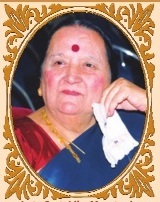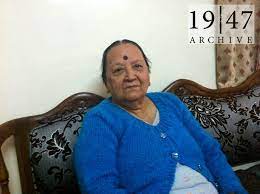
By the time Leela Mamtani was fifteen, she had been to jail twice for taking part in Congress rallies against British rule.
Dadi Leela Mamtani was born in Kandyaro town of Naushehro Feroze District (Former Nawab Shah District) of Sindh, Pakistan on October 21, 1932. Until the age of fifteen, she lived in Kandyaro while her brothers lived in Karachi and Hyderabad. Her father was a prominent landlord and they lived in a huge haveli. The house had various secret cupboards called hoori, which were used to hide valuables. In 1947, the family had to abandon two hoori full of riches.
Mrs. Mamtani walked down the memory lane when she described the family life in Kandyaro during an interview for recording of oral history. Her family had very harmonious relations with Muslims and there were brotherly sentiments. Mrs. Mamtani recalled her mischief from childhood and shared memories with friends Devi, Tilli and Sheila. They used to bunk classes and ran into the orchards for fruits or the ponds and waterfalls. Mrs. Mamtani mentioned a festival Thaddari which was celebrated during the monsoon months. It was not a religious festival but a community celebration when all the families got together for singing and merriment, and exchanged sweet breads.
Mamtani’s family offered prayers to the water god Darya Shah. Folk songs were a major part of all revelry- community or religious and all major activities like child birth, marriages, crop harvest. Mrs. Mamtani burst into a melodious song that the women used to sing overnight during celebrations.
Another unique aspect was the intricate embroidery work of Sind province, mostly done by Muslim ladies. The markets in Kandyaro were elaborate and segregated according to commodities- cloth, general items and food. The Indian National Congress, in its bid to raise awareness about the national movement, was popularizing the spinning wheel charkha, which went on to become the symbol of India’s freedom movement.
Mrs. Mamtani recalled they had a dedicated period at school every day for learning how to spin the wheel and weave yarn. The Congress organized rallies to ignite the patriotic fervor amongst everyone. With an air of pride for the country, Mrs. Mamtani said, “By the time I was fifteen, I had been to jail twice”. The months of 1947 that saw British India’s freedom and consequent division of the land were met with hardly any disturbances in Kandyaro.
Mrs. Mamtani recalled sporadic attacks and night long pelting of stones at her house. By December of 1947, the attacks increased in intensity and the family had collected stones and red chili powder for protection.
On January 1, 1948 Mrs. Mamtani’s family decided to leave and took a bus to Hyderabad with all that they could carry. On their way to the port city of Karachi, the family was robbed off everything. After five days, Mrs. Mamtani boarded a ship with her family for Mumbai. The captain of the ship did not know the directions for Mumbai and he anchored in the middle of nowhere. Mrs. Mamtani remembered the conditions of sea sickness and loss that had gripped everyone. The ship then docked in Kutch in Gujarat. After moving through several towns the family settled in Ajmer, Rajasthan.
 After her marriage to Mr. Satram Mamtani in 1952, Mrs. Mamtani moved to Delhi. Her talent in singing was acknowledged by a music director Darshan Singh, and he trained her in modern vocal music. Mrs. Mamtani went onto become a radio singer of repute. She sung in Sindhi, Hindi and Punjabi from All India Radio; and worked hard to popularize and preserve Sindhi folk songs. Her radio programs were also broadcast in Pakistan by the External Affairs Ministry of the government of Pakistan. She wrote poems and a book of her poetry collection had also been published. .
After her marriage to Mr. Satram Mamtani in 1952, Mrs. Mamtani moved to Delhi. Her talent in singing was acknowledged by a music director Darshan Singh, and he trained her in modern vocal music. Mrs. Mamtani went onto become a radio singer of repute. She sung in Sindhi, Hindi and Punjabi from All India Radio; and worked hard to popularize and preserve Sindhi folk songs. Her radio programs were also broadcast in Pakistan by the External Affairs Ministry of the government of Pakistan. She wrote poems and a book of her poetry collection had also been published. .
In 2009, Mrs. Mamtani was invited by the Urdu Services of the BBC London to visit Sindh. She recalled with nostalgia the love and warmth she received as she travelled across the province. She also visited her old house and hometown. People loved her there and arranged for recording her songs.
Dadi Leela Mamtani, as she was called, passed away on November 27, 2016.
______________________
Courtesy: Stanford Libraries and some other websites